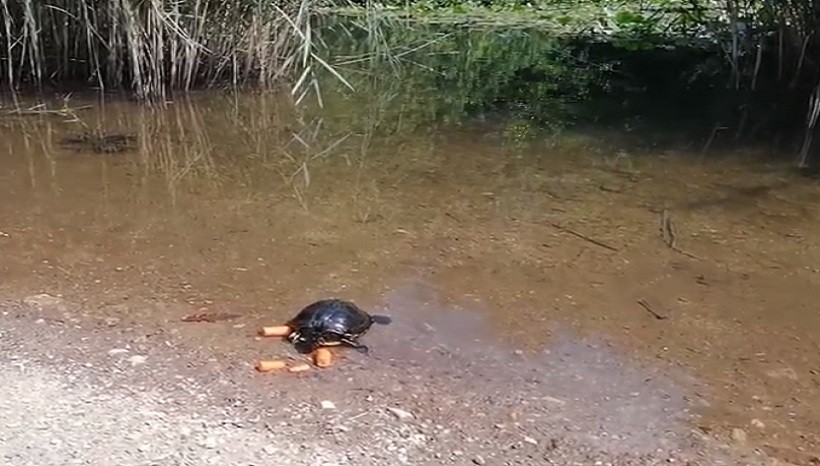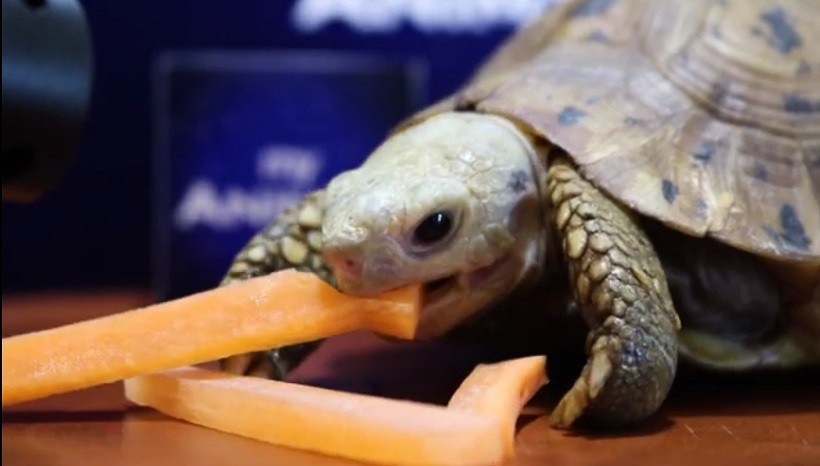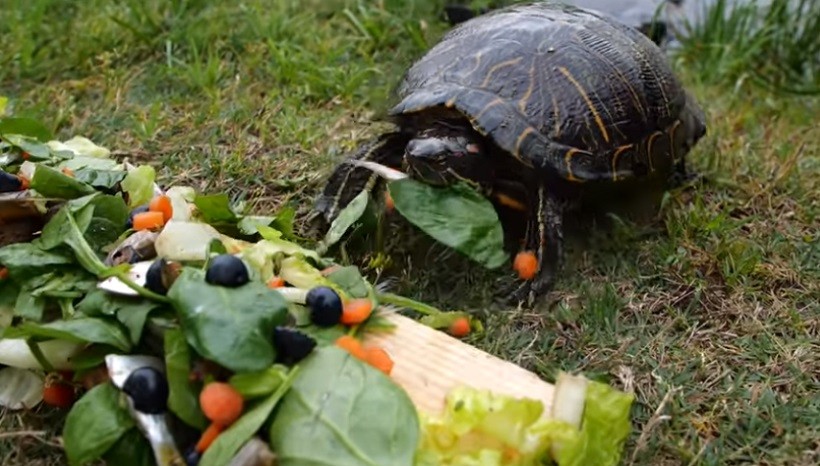Yes. Turtles can eat carrot. Carrot is filled with a number of vitamins, along with proteins and other nutrients make it a delicious food for turtles. Turtles love the crunchy taste of carrot there is no restriction on how many carrots should be consumed at a particular time. It is because the amount of carrot or other food always goes with a turtle, whether it’s suitable for him or not.
Turtles like to live an independent life. Confining them is not ideal for them. Turtles raised in a confining environment can be good pets. When it comes to their diet, turtles mostly like to eat fresh products such as fresh vegetables and fruits and also stuff like kale, collard, mustard, etc. however, maybe every vegetable and fruit aren’t ideal for them. But here we’ll question carrots. Are carrots good for turtles? Let’s have a look below that whether or not turtles eat carrots or not and whether it is good for them or not.
Does Turtle Eat Carrots?
A simple answer to this simple question is yes. Most turtles love carrots. Carrots filled with different vitamins and nutrients make them a rich source for the body. Turtles love their delicious taste and enjoy eating carrots. Moreover, carrot juice soak is also famous when it comes to feeding carrots to turtles. However, what should be a perfect diet for a turtle largely depends on his age and species. Nevertheless, a perfect nutritional diet for a turtle is compulsory for him to live a healthy life.
Is Carrot Healthy For Turtles?

Carrot is a rich source for Vitamin A, Vitamin C, Vitamin E, different nutrients, Potassium, Calcium, Iron, Fat Carbohydrates, a lot of energy, and much more. All this combo makes a super healthy and perfect diet for any person or an animal.
It’s a well-known fact that turtles stores Vitamin A in their liver. This plays a super vital role in their eyesight, reproductive system, immune system, and in their body growth. Inadequacy of Vitamin A in the body can bring about Hypervitaminosis A, ear, and oral abscesses. There is a chance that it can also affect the turtle’s vision and can result in squamous metaplasia. It is important here to mention that overdose of Vitamin A can also leave negative impacts. It can result in the same way as the deficiency of Vitamin A can result.
Apart from this, Phosphorous and Calcium are super beneficial for the turtle’s body. These both play a key role in the strengthening of bone and growth of the shell of a turtle. Additionally, both these minerals keep the muscle function intact. If the turtles don’t get the required amount of Calcium in their diet, their shell growth can be affected and turtles can face turtle shell pyramiding. Due to Calcium deficiency, there is a chance that turtles can face swollen head lumps. Carrot is very rich when it comes to dietary fibers. The high fiber content helps in improving the turtle’s digestive system.
Raw Carrots Or Cooked Carrots?
Well, there is no negative side or either raw carrot neither cooked one. Mostly, turtles love to eat a carrot in its raw form. Their delicious taste and crunchy nature are loved by turtles. There is no harm for turtles in eating carrots in raw form.
When it comes to cooked carrots, carrots are cooked form are more nutritious than they are in raw form. As discussed earlier, carrots are jam-packed with different nutrients and vitamins. Vitamin A and Vitamin E are heat-stable by nature. This means cooking or boiling them won’t affect their nutritional power. Although, cooking carrots, breaks their cell walls which result in freeing up more nutrients than before.
If your turtle doesn’t like raw form carrot, there is a quite good chance to go with cooked one which might taste them better and they make carrot their part of the regular diet.
Nutritional Facts About Carrots

Carrot being a root vegetable is highly beneficial for the body and a rich source of different nutrients, protein, and vitamins.
- There is almost 88% of water is confined in a carrot and water is super beneficial for the body
- Carrot is an excellent source of vitamin A in the shape of beta carotene
- Carrots are also a good source of several B vitamins, including vitamin K and Potassium
- Carrots offer many plant compounds, including carotenoids
These substances offer a powerful antioxidant activity that has been connected with the improvement of immune function and reduces the risk of many illnesses.
Can Red-Eared Sliders Eat Carrots?
Red-eared sliders require a diet that is a combination of both animal and plant feed. Red-eared sliders can make very good pets but their diet should be planned with more focus. Although, they are omnivores but love to eat aquatic plants along with small fishes and even other insects. Keeping their health good is quite a challenging task. It is recommended and also mostly pet owners who pet red-eared turtles give them commercial pellets in their diet to maintain their optimal health and growth.
Carrots are often regarded as one of the favorite foods of red-eared turtles. Carrot is one of the healthier choices for these turtles. Baby red eared turtles’ diet should be omnivorous because that helps them in quick growth and in turtle’s development. Although baby red-eared sliders can have carrots it’s better to give a more omnivorous diet as their body demands quick growth at their age.
Are Nutritional Supplements Good For Red-Eared Slider Turtles?
Nutritional supplements are always good in a turtle’s diet but one thing must be always in mind that excess of everything is bad. As we discussed earlier that excess of Vitamin A can result in the same way as the deficiency of Vitamin A, similarly, excess of nutritional supplements can lead to some negative results also. If going for a nutritional supplement, a reliable reptile multivitamin that contains a reliable amount of Calcium and Vitamin D3 must be used.
A combination of regular turtle’s food with nutritional compliments twice a week makes a portion of good food for red-eared slider turtles to eat. Mostly, veterinarians have recommended sometimes slightly sprinkle the food Calcium powder including lactate, carbonate, and gluconate. Over supplementation is the thing you must be more careful at. It’s not necessary to always use these nutritional supplements with regular food. A perfect balanced nutritional profile is necessary and these diet combinations make it perfectly good.
Do Turtles Eat Vegetables?

Interest turtles show in the either herbivorous or omnivorous diet is dependent on the type of turtle you have as turtles are both herbivores and carnivores. Although, in a nutshell, turtles love both foods. As per the guidelines of a veterinarian, a balanced turtle diet includes half of the plant-based material diet and the other half contains an animal-based material diet.
Turtles like to have food of plant-based material. Mostly, its composition of plant-based material diet includes 80 – 90 % of vegetables and sometimes flowers also and other 10 – 20 % is completed by different fruits.
Vegetables including collard greens, parsley, mustard greens, turnip greens, spinach, kale, cactus, peas, corn, sweet potatoes, cabbage, and broccoli sound good and go well in the diet of turtles. Flowers which include carnations, roses, and hibiscus are liked by turtles in their food. Fruits that are liked by turtles include peaches, apples, grapes, bananas, and melons. Fruits that are particularly healthy and good for health include figs. Figs contain Calcium which is a rich source for the development of bones and shells of turtles. Apart from these fruits, raspberries and strawberries are also loved by turtles.
Vegetables can be offered in both ways, raw form, and cooked form. Try both the foods and with which the turtle is feeling good and showing interest. If he is stable with cooked food, give him the cooked ones and if the turtle shows interest in raw formed carrot, serve the turtle with raw formed carrot.
How Many Carrots Can A Turtle Eat?
Firstly, can a turtle eat carrots? And the answer is Yes as discussed above briefly. Now, how much should be the number of carrots in their diet. Well, this depends on the turtle itself. It should be in the quantity the turtle himself is interested in. try to serve him less first and then slowly and gradually increase the quantity if and only if the turtle is interested. Overeating can lead to unhealthy stuff. The best way to serve these is to shred them so that turtles can easily digest these carrots.
Conclusion
Well, carrots for turtles are good if they are used in a proper manner. No deficiency and neither excess of carrots is food. A balanced diet is always good for a healthier life.
If you are fond of petting turtles, then you have to be extra careful with their health and diet plans. A healthy balanced diet plan is necessary for them to live a good and healthy balanced life. If you own baby turtles, it is better to cut the carrots in small pieces before serving them as it will be easy for turtles to eat them if you are going with raw-formed carrots. Well, you can also try with cooked carrots. It is important to notice the interest turtles are showing in either of the cooked carrots or raw formed carrots. Feed them the way they like carrots to fill their tummy.
{ "@context": "https://schema.org", "@type": "Article", "mainEntityOfPage": { "@type": "WebPage", "@id": "https://petshoods.com/can-turtles-eat-carrot/" }, "headline": "Can Turtles Eat Carrot? How Many Carrots Can A Turtle Eat?", "description": "Do Turtles Eat Vegetables? — Yes. Turtles can eat carrot. Carrot is filled with a number of vitamins, along with proteins and other nutrients make it a delicious food for turtles.", "image": "https://petshoods.com/wp-content/uploads/2021/08/Can-Turtles-Eat-Carrot.jpg", "author": { "@type": "Person", "name": "Jeremy" }, "publisher": { "@type": "Organization", "name": "Petshoods", "logo": { "@type": "ImageObject", "url": "https://petshoods.com/wp-content/uploads/2019/02/13925402_1502331219793083_1620090286454245017_n.jpg" } }, "datePublished": "2021-08-12", "dateModified": "2021-09-08" }